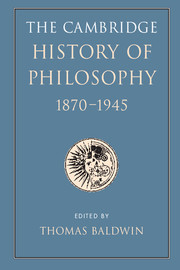Book contents
- Frontmatter
- Contents
- List of contributors
- Introduction
- I 1870–1914
- II 1914–1945
- 8 Logic and philosophy: the analytic programme
- 9 The diversity of philosophy
- 10 Knowledge, language, and the end of metaphysics
- 11 Philosophy and the exact sciences
- 12 Mind and its place in nature
- 51 Vitalism and emergence
- 52 Behaviourism and psychology
- 53 Gestalt psychology
- 54 Wittgenstein’s conception of mind
- 13 Philosophy and social science
- 14 Ethics, religion, and the arts
- 15 Law and politics
- Biobibliographical appendix
- Bibliography
- INDEX
- References
53 - Gestalt psychology
from 12 - Mind and its place in nature
Published online by Cambridge University Press: 28 March 2008
- Frontmatter
- Contents
- List of contributors
- Introduction
- I 1870–1914
- II 1914–1945
- 8 Logic and philosophy: the analytic programme
- 9 The diversity of philosophy
- 10 Knowledge, language, and the end of metaphysics
- 11 Philosophy and the exact sciences
- 12 Mind and its place in nature
- 51 Vitalism and emergence
- 52 Behaviourism and psychology
- 53 Gestalt psychology
- 54 Wittgenstein’s conception of mind
- 13 Philosophy and social science
- 14 Ethics, religion, and the arts
- 15 Law and politics
- Biobibliographical appendix
- Bibliography
- INDEX
- References
Summary
Gestalt psychology was a movement related to phenomenology, especially that of Husserl, a contemporary of the founding Gestalt theorists. Gestalt psychology and phenomenology arose from the philosophy of Brentano, which emphasised the description of consciousness, rather than its analysis. However, Gestalt psychologists were scientists, not philosophers, wanting to put psychology on sound experimental footings and seeking physiological explanations of consciousness. Their work extended beyond investigating consciousness to include memory, problem solving, creativity, group dynamics, child development, and animal behaviour, although their theories in these areas were informed by their original theorising about perception. Moreover, the movement’s changing historical circumstances took Gestalt psychology ever farther from philosophy. The Gestalt psychologists were second-generation German psychologists, struggling against philosophers to win autonomy in the German university system. Like phenomenology, Gestalt psychology arose in a country already deeply troubled by modernity which then experienced the vicissitudes of the First World War, the Weimar period, and the rise of Hitler and Nazism (the best general account of the development of Gestalt psychology is Ash 1995). The major Gestalt theorists joined the diaspora of German intellectuals to the United States. There, the Gestalt movement was shaped by a culture very different from Germany’s, and by their encounter with behaviourism.
- Type
- Chapter
- Information
- The Cambridge History of Philosophy 1870–1945 , pp. 649 - 657Publisher: Cambridge University PressPrint publication year: 2003
References
- 1
- Cited by



